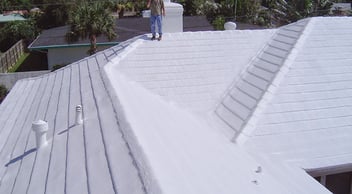- Home »
- Learningcenter »
- Silicone vs acrylic roof coating
Silicone vs Acrylic Roof Coating
When looking at roof coatings, it can be hard to know where to begin. For commercial roof coatings, silicone and acrylic are the two most widely used types - but which is better? It's hard to quantify which of the two is the better coating, but there are several things to look at and compare when deciding what's best for your roof.
What's The Difference?
The first thing to look at is what makes silicone and acrylic different. Silicone and acrylic differ on the chemical level - silicone is made of a chemical solvent, and in acrylic products, this solvent is replaced by water. This property makes silicone coatings non sacrificial - meaning that they do not shed. Acrylic roof coatings are sacrificial, and because of this will lose mil thickness as they age, making their lifespan significantly shorter than that of silicone.
Cost
Cost is definitely a factor when deciding whether to go with a silicone roof coating or an acrylic roof coating. While they are both great options for commercial roof coatings, silicone tends to rate better overall on many factors, such as longevity, durability, and water resistance. Acrylic also has many great properties, but overall, being the more affordable option of the two is one of the major selling points for choosing acrylic over silicone.
Longevity
Overall, silicone lasts longer and stands up better to the elements. While silicone and acrylic have similar tensile strength, acrylics don't have the same staying power as silicone does. This is largely due to the main difference between acrylic and silicone, being that acrylic is water based and silicone is not. Acrylic polymers wear down over time, and are prone to what is called "chalking" - which is the residue that results as the material breaks down over time, causing it to lose thickness as it ages.
Reflectivity
Silicone and acrylic coatings have similar UV reflectivity when first applied (around 80-90%) but in the long run, acrylic actually rates better in this regard. The reason UV reflectiveness is so important is that when sunlight strikes a polymer, it absorbs some of the radiation. This radiation causes the polymer to vibrate, and in turn break up into smaller pieces. Ultimately this degrades materials over time through what is referred to as ultraviolet degradation. Acrylic polymers are transparent to ultraviolet radiation - meaning that they don't absorb the suns radiation, and actually reflect it away from the roof material and back into the atmosphere. Silicone also has this property, but over time, because of the nature of the material, debris don't shed off of silicone as easily - disrupting it's ability to fully reflect UV rays.
Resistance To Ponding
When it comes to water resistance, there is no doubt that silicone is the winner in this regard. Silicone is not water based, so ponding water will not cause silicone to break down, because it's completely waterproof almost from the moment it's laid down. (Ponding water is still detrimental to a roof for several reasons, but silicone stands up to it well). Because acrylics are water based, water causes them to break down more rapidly when ponding is an issue (ponding is defined as water that remains on a roof for longer than 48 hours) - if you have a flat roof where ponding is more likely to occur, silicone is always going to be the better option.
Ease Of Application
A big part of the reason that acrylic and silicone differ in price is the way they need to be applied. Acrylic coatings can be applied like paint, since they are water based, single compound materials applied easily with a brush, a sprayer, roller, etc. Silicone on the other hand, requires specialized equipment and is much more difficult to clean up. Some silicones even requires two component mixing (comprised of a cross linker and a catalyst) that make application even more delicate.
Environmental Impact
Acrylic has a lower environmental impact over silicone, largely because it's a water based material. Acrylic coatings have VOC (Volatile Organic Compound) levels almost 3 times lower than silicone, in addition to typically giving off much less odor. However, the silicones of today have come a long way, and many are formulated with little to no solvents and low VOCs. This makes many silicones, especially high-solids silicone coatings still very environmentally friendly all things considered.
Final Thoughts
When it comes to deciding whether to choose silicone or acrylic for your roof coating, there are a lot of factors to take into consideration. Each material comes with its pros and cons. If you need help deciding what's right for your roofing project, reach out to Colony Roofers today - we offer free 30 minute inspections, and are always ready with a team of knowledgable and dedicated professionals that are happy to answer any questions you may have, and guide you along the way of making important decisions for your property.
 Call (678) 365-3138
Call (678) 365-3138

